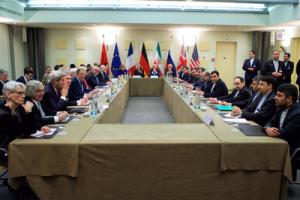IranIran ships enriched uranium to Russia as part of nuclear deal
On Monday Iran took the most important step so far toward complying with the nuclear agreement it had signed with the P5+1 power by shipping 25,000lb of low-enriched uranium to Russia. Iran had until the end of 2015 to ship out all of its low-enriched uranium it has stockpiled – except 660lb which the agreements allows it to keep.

Meeting of the 5+1 negotiator // Source: wikipedia.org
On Monday Iran took the most important step so far toward complying with the nuclear agreement it had signed with the P5+1 power by shipping 25,000lb of low-enriched uranium to Russia.
The agreement requires Iran to scale back its nuclear program so that it would not be able to produce a nuclear weapon in a short notice. In return, Iran will receive assets which were frozen in foreign banks as part of the economic sanctions imposed on Iran because of its nuclear activities. Reports in the press mention the figure of $100 billion in frozen assets which Iran would be entitled to – but the nuclear activities-related frozen assets amount to about $29 billion, and this is all Iran would get if it complies with the agreement. About $70 billion in Iranian assets were frozen as a result of its support of terrorism and nationalizations of Western businesses following the 1979 toppling of the Shah. The nuclear agreement does not release these frozen assets to Iran.
Al Jazeera reports that Iran had until the end of 2015 to ship out all of its low-enriched uranium it has stockpiled – except 660lb which the agreements allows it to keep.
Secretary of State John Kerry welcomed the Iranian move. “The shipment included the removal of all of Iran’s nuclear material enriched to 20 percent that was not already in the form of fabricated fuel plates for the Tehran Research Reactor,” he said.
“This removal of all this enriched material out of Iran is a significant step toward Iran meeting its commitment to have no more than 300 kilograms of low-enriched uranium by Implementation Day.”
Kerry praised Russia, “a country with significant experience in transporting and securing nuclear material,” for taking the material out of Iran and providing natural uranium in exchange.
Iran has also committed to sharply reduce the number of uranium enrichment centrifuges, as well as to re-engineer its Araq reactor to cut its output of plutonium.
The International Atomic Energy Agency (IAEA) will make the determination whether Iran has complied with its obligations. If the IAEA says Iran has complied, the United States, Russia, China, Britain, France, and Germany will cancel some economic sanctions that targeted the nuclear program.
The full implementation of the nuclear deal is facing an unexpected threat: A couple of weeks ago, as part of its efforts to tighten the security of the Visa Waiver program, a program which allows citizens of thirty-eight countries to enter the United States without a visa, Congress passed a measure which stipulated that citizens of these thirty-eight countries who had traveled to Iraq, Syria, Sudan, and Iran would not be eligible for the program. Moreover, any citizen of one of these thirty-eight countries who hold a dual Iranian nationality would also not be eligible to participate in the program.
Iran said it regards the measure as a violation of the nuclear agreement since it changes the nature of the relationship between the two countries – and does so unilaterally. When asked about the U.S. law on Monday, Iranian foreign ministry spokesman Hossein Jaberi Ansari told a press conference: “Any steps taken outside the agreement are unacceptable to Iran, and Iran will take its own steps in response where necessary.”
